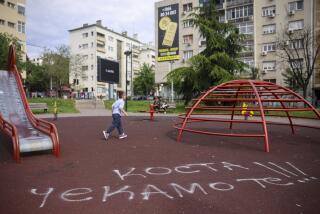Gojko Susak; Croatia Minister of Defense
- Share via
ZAGREB, Croatia — Gojko Susak, Croatia’s defense minister and a close ally of President Franjo Tudjman, is dead at the age of 53, the state-run HINA news agency reported.
A nationalist who devoted his life to creating and preserving Croatia’s independence, Susak also became a useful ally of the United States as it sought to end the war in Bosnia.
Susak, who died Sunday night, was treated for lung cancer in 1995 in Washington and underwent surgery in Boston in 1997. Earlier this year, he had appendix and ulcer operations and cut down on public activities and appearances.
At a special government session Monday, Prime Minister Zlatko Matesa said the funeral would be held Thursday at Zagreb’s main cemetery, and declared Thursday a day of mourning.
As defense minister since 1991, Susak led Croatia’s fight against the Serb rebellion that temporarily left a third of Croatia in Serb hands before the 1995 Croatian army offensive that defeated the rebels.
A native of the Croat-dominated region of Herzegovina in southwestern Bosnia, Susak favored close ties between Bosnian Croats and Croatia proper. He moved away from the idea of annexing territories inhabited by Bosnian Croats because of pressure from the United States and its allies.
His defense portfolio passes to his deputy, Col. Gen. Kresimir Cosic. But it is unclear who can replace him as patron of Bosnia’s Croats, a vacuum that could unsettle fragile relations with Bosnian Muslims.
Susak was born March 16, 1945, in Siroki Brijeg, Bosnia-Herzegovina. In 1969, he broke off studies of mathematics and physics and went to Canada, eventually running a Toronto pizzeria.
In 1989, as the Communist Yugoslavia he despised was disintegrating, Susak returned, helping Tudjman win Croatia’s first multi-party elections in 1990.
Croatia declared independence on June 25, 1991. Susak earned respect among many Croats for organizing and arming--through ties to wealthy emigres--a force that defended the most territory against rebel Serbs and the Serb-led Yugoslav People’s Army during a six-month war.
Then, with American help, Susak modernized his army, and it crushed the Serb rebels in two lightning offensives in 1995.
Susak spearheaded crucial support to Bosnia’s Croats throughout the 1992-95 war there, including a yearlong conflict with the Muslims during which both sides committed atrocities.
But Susak also developed close ties with Washington, and American military advisors helped rebuild the Croatian army. Susak helped persuade Bosnia’s Croats to accept the 1995 Dayton peace accord, which thwarted the extremists’ goal of uniting with Croatia proper.
In 1997, fearing that Washington would punish an uncooperative Croatia, Susak helped arrange the surrender of 11 Bosnian Croat war crimes suspects to The Hague tribunal. Susak, not Tudjman, announced it, apparently to defuse Bosnian Croat protest.
“He always kept his word,” said Jacques Klein, a senior U.S. diplomat in the region. “When he could do something, he would say he would do it. And he did it.”
Susak is survived by his wife, Djurdja, and four children.
More to Read
Sign up for Essential California
The most important California stories and recommendations in your inbox every morning.
You may occasionally receive promotional content from the Los Angeles Times.











